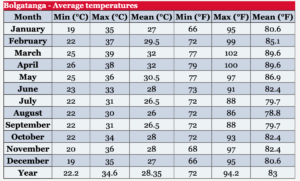Nothing is better than a tropical climate which is the typical climate for Ghana, World Travel Guide states “Daytime temperatures are high throughout the year, approaching or surpassing 86°F on most days”. While the days are hot, the temperatures often drops to 68°F at night. World Travel Guide also describes the two rainy seasons in Ghana, “from March to July and from September to October, Rainfall is highest in the south, with some areas receiving in excess of 2,000mm each year, but the drier north more typically receives about 800mm annually” (World Travel Guide,2019).
According to the World Bank Climate Change Knowledge Portal, Ghana has three hydro-climatic zones, South-Western System, the Volta basin system, and the Coastal basin system.
The South-Western system is the most humid part of the country, where as the Coastal basin system is the driest.
World Bank Climate Change Knowledge Portal states “the Mean annual Temperature has been 81.8°F, and the Mean annual precipitation is 1169.20mm based on data from (1991-2020)”(World Bank Climate Change Knowledge Portal).
Figure 1. from climatestotravel.com, displays the average temperatures of Bolgatanga, which is located in the far north of Ghana.

Similar too many cities in Africa, the capital city of Ghana Accra is vulnerable to natural hazards and disasters, which is stated in the research of Charles Yaw Okyere, Yira Yacouba, and D. Gilgenbach. In their research they also state the reasoning behind the natural disasters in Ghana are because of water, “through flooding or stormy rain or drought, and bush fires” (Okyere, Yacouba, & Gilgenbach, 2013).
In Figure 2. the chart shows the natural disasters that have struck Ghana from 1900 to 2014, with droughts, floods, and epidemics being the most frequent.

Page Author : Justin Soto




